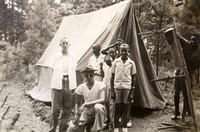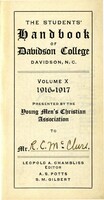YMCA
According to the Young Men’s Christian Association 1931 Annual Report, the Davidson College chapter formed as, “Davidson men of past and present have poured into a ‘melting pot’ the greatest gifts of their personality, their ideas and their ideals. From this contribution has arisen that structure on our campus which we call the ‘Y’.”(Annual Report 1930-1931). The YMCA was first listed as a Student Organization in 1878. From 1878 to 1945, the student organization saw a number of transformations, including the construction of their own building, Morrison Hall, as the YMCA grew into one of the most prominent groups on campus.
The YMCA chapter was formed by the students themselves in hopes of creating an environment that fostered service and spiritual development. Commonly referred to as the “Y”, the YMCA was much more than just a young men’s fellowship. This organization at Davidson grew to be a center for social activities and service work. This service work reached not only the Davidson community, but the greater Mecklenburg County area, through initiatives such as Boy Scout troops, missionary gifts, and “freshmen work”- essentially, acclimating Davidson freshmen to their first year. The YMCA was also responsible for hosting numerous speakers and forums for theological conversation at Davidson.
The organization was composed of students and faculty advisors. All of the important decisions were made by the Board of Control. As the meeting minutes suggest, this group was responsible for maintaining all YMCA responsibilities, as well as managing the finances of the organization and the cabinet members. The cabinet members were in charge of particular projects, exemplifying how the YMCA divided up tasks in order to affect as many people as possible.
Of the number of successful projects throughout the beginning of the twentieth century, perhaps the most involved work was with young boys in the community through Boy Scouts, encouraging attendance to religious events and services, and finally establishing a thriving social scene surrounding the YMCA and its members.
Boy’s Work
The first mention of the YMCA encouraging a mentorship between college-aged men and young boys from the community was in 1916, with the formation of a “Boy’s Club.” The Boy’s Club was a social center that allowed elementary and high school-aged boys from the Davidson community to read and play games with the guidance of Davidson students. This blossomed into what became Davidson’s long time commitment to the Boy Scouts of America.
In 1929, five troops were led by Wildcats in the Davidson area which reached approximately 100 young men. These boy scout troops met once a week for spiritual, physical, and character training. The YMCA volunteers also created recreational football, basketball and baseball teams that competed against one another in a “little league” of sorts (Annual Report 1929-1930).
The YMCA’s work with boys in the community became increasingly popular for both area youth and the college-aged volunteers. Davidson students did more than volunteer to spend time with the young boy scouts. They also intended to come up with an encompassing curriculum that created versatile young men. In a statement from the General Secretary, Bill Rule, he wondered if, “we [should] get someone to make a sex talk with these boys?” Moreover, it goes to show that the emphasis of the YMCA was not only to serve, but to educate and foster the development of well rounded adolescents.
Due to the increase in popularity of the five active troops–two white troops in Davidson, a “colored” troop, a troop in Mount Mourne, and a Cornelius troop–that had been established, two more boys clubs were added. The new troops were the Hi-Y club for high school aged boys as well as the Mill Boy’s Club (Blodgett).
The Hi-Y, a group specifically made for high school boys, was very closely affiliated with Davidson College Presbyterian Church. Hi-Y was more geared towards mentorship of Christian principles, rather than a recreational outlet (Blodgett). The Mill Boy’s Club focused on the children of mill workers in the town of Davidson.
The distinction between the different boy scout troops illuminates the social climate of the time. In their 2013 history of Davidson, Blodgett and Levering note, “despite close relationships between black servants and affluent white families and the interaction of students with mill workers, the social and economic divisions between groups were deepening” during the early twentieth century (Blodgett and Levering 67). The divide created by race and socioeconomic status were so ingrained in the social climate at Davidson College that these perceptions even affected service work at Davidson. Ironically, while the YMCA prided itself as upholding the Christian values of generosity and brotherly love, these men only did so in a context that marginalized certain groups of people.
Given their strong reputation in the Davidson community and the number of men involved, the campus YMCA clearly succeeded in building connections with the outside community.
Religious Work
Much of the service work done through the YMCA was done with a Christian focus. In 1926, the YMCA annual report noted that only three students at Davidson College “remained out of the church,” which demonstrates the gravity that spiritual practice held at Davidson.
One primary source of religious service work through the YMCA were deputations. Deputations were essentially the student-run worship services, high hchool youth group meetings, and Sunday School classes. The YMCA also supplied religious teachers to local hospitals and a convict camp (YMCA Annual Report).
Walter Lingle a college alumni, class of 1892, Board of Trustees member, and college president, accounts his experience in the devotional meetings that were held each evening in saying that, “the college Y.M.C.A. had more to do with the development of my spiritual life than the church” (Lingle 55). Lingle had an important spiritual moment at one such meeting. At the end of each devotional, someone was chosen to lead prayer, and Lingle avoided being chosen for this task by hiding behind one of the poles in the room. One evening, however, he was called upon. After this moment of prayer, he vowed to do his part and became a “staunch believer in the YMCA” (Lingle 56).
Another student, Albert McClure, class of 1927, used the experience gained through these deputations to volunteer to fill the void and act as the primary Mill Chapel pastor for a period of time in 1930. During this time, he successfully built up the congregation and expanded the Sunday school program; his contribution as a minister was revolutionary to the church’s success (YMCA Annual Report).
One particularly popular YMCA worship service was the weekly Sunday evening Vesper service. This service featured music and a strong emphasis on student led worship. Although Vesper services were eventually dropped from the student schedule, the special Christmas Vesper service continued on as an important college traditions (Blodgett). The funding that once went towards weekly Vespers was transferred to the Bible Study fund (YMCA Annual Report).
Another important project of the Y was the “Annual Student Body Gift.” This money was raised for various Christian endeavors. In 1932, a portion of these funds were donated to facilitate the creation of the “Unity Church.” Also known as the “Mill Chapel” this church worked specifically with the plocal opulation of mill workers. The annual gift was also geared toward funding mission work. For example, in 1939, the YMCA had set aside enough money to send a missionary to China and to donate to the China relief fund (Board of Control Meeting Minutes).
Because religion was at the forefront of the YMCA’s mission, it is no wonder that spirituality seeped into the service work of the YMCA as well. Rooted in Christianity, the YMCA was successful at establishing a number of services, missionaries, and fundraising projects throughout the early 20th century.
Social Life
Although most of the work of the YMCA emphasized religion, there was also a strong element of social life. Morrison Hall hosted games such as pool and ping pong and was also described as a center for campus social development.
To assist incoming students in learning about the ins and outs of Davidson College life, in 1916 the YMCA began to print the Wildcat Handbook. As an extension of this handbook, the YMCA began to host the annual freshman orientation program. This event was a chance to allow freshmen to acclimate themselves to college life through fun and festivities that consisted of a “profusion of cakes, ice cream, ladies, and freshmen” (“Locals”). This event was also created to “[soothe] the hearts of those who for the first time had left their homes and their best girls” (“Locals”). Through these events, the YMCA clearly displayed a focus on helping new students adjust to the changes in social scene when arriving at college rather than assisting them for the rigorous academics that were to follow.
The YMCA’s final effort to ease the transition into college life for freshman was the development of “The Friendship Council” in 1932. An appointed man from each hall was responsible for holding nightly prayer meetings as well as meeting with students to guide the transition into college (YMCA Annual Report).
Much of the social life aspect of the YMCA was geared towards non-fraternity members. In the words of the 1930-1931 annual report, “if the social expression of these men is stifled in these formative years, it is likely that they will never achieve a well developed personality.” Because the YMCA was a non-greek organization, the members of this club wanted to create a space where men uninvolved in Greek life could interact and engage. This desire came to the forefront of the 1940 annual report, which describes an interest in establishing a Student Union.
In addition to interacting with men their age, the YMCA facilitated social gatherings between men in the YMCA and women at Queen’s College. Although the YMCA provided transportation for interactions between these closely affiliated college, interactions were limited due to the standards that the church held the men to. Ultimately, because of the YMCA’s Christian focus, the club did not follow through with the proposal for a “cross-college” social day. Evidently, a social centered around male and female interactions “threatened” the ideal of purity that the YMCA upheld (YMCA Annual Report).
Clearly, the YMCA at Davidson College was much more than merely a religious and service organization. Its influence seeped into all aspects of life at Davidson College in the early 20th century. From the community outreach work, to mission trips to far off places, the YMCA’s impact was far spread.
Works Cited
Blodgett, Jan. Personal Interview. 19 February 2016.
Blodgett, Jan. Personal Interview. 23 Februrary 2016.
Blodgett, Jan, and Ralph Levering. One Town, Many Voices: A History of Davidson, North Carolina. Davidson: Davidson Historical Society, 2012. Print.
Davidson College Handbook. 1916-1917. Davidson: Davidson College.
Davidson College. Quips and Cranks Vol. 34. Davidson: Davidson College, 1931.
Lingle, Walter L. Memories of Davidson College. Richmond, Virginia. Knox Press, 1947.
“Locals.” Davidson Monthly October 1892: 42.
Rule, William.Personal Scrapbook. DC 238S. Davidson College Archives, Davidson, NC.
Y.M.C.A Annual Report. 1929- 1930. RG 6/13. Y.M.C.A. Records. Davidson College Archives, Davidson College, NC.
Y.M.C.A Annual Report. 1930-1931. RG 6/13. Y.M.C.A. Records. Davidson College Archives, Davidson College, NC.
Y.M.C.A Annual Report. 1929- 1946. RG 6/13. Y.M.C.A. Records. Davidson College Archives, Davidson College, NC.
Y.M.C. A. Board of Control Meeting Minutes. 1928-1949. RG 6/13. Y.M.C.A. Records. Davidson College Archives, Davidson College, NC.
Authors: Allison DeMoya, Daisy Jones, Austin Leonards
Cite as: DeMoya, Allison, Daisy Jones and Austin Leonards. “YMCA” Davidson Encyclopedia. May 2016. https://digitalprojects.davidson.edu/omeka/s/encyclopedia/page/ymca





